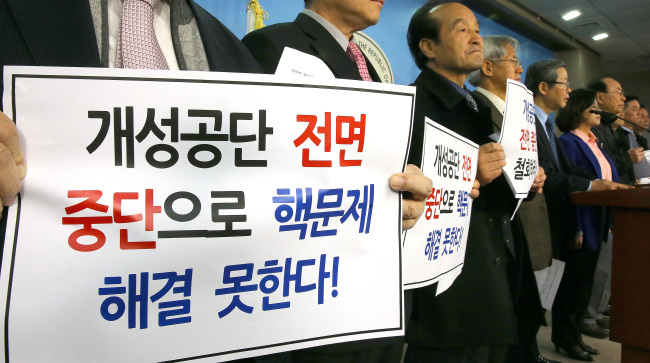The South Korean government’s decision to shut down the cross-border Gaeseong industrial park following North Korea’s rocket launch sparked heated debate among political parties Thursday over the unprecedented measure.
While the ruling Saenuri Party hailed the move as an “inevitable” call to counter the reclusive regime’s relentless attempts at developing nuclear programs, the opposition parties denounced the government for undermining reconciliation efforts between the two Koreas.
“Given the gravity of the current situation, the decision to suspend operations at Gaeseong park is an inevitable one. National security is the most important agenda related to the country’s survival,” said Saenuri Party chairman Kim Moo-sung.
Calling North Korea an “unpredictable” and “rogue” regime that threatens international security, Kim urged pacifist liberals to abandon “idealist” belief in the North and join in passing pending security laws related to counterterrorism measures and human right conditions in the impoverished country.
Kim’s hawkish rhetoric was echoed by other senior Saenuri lawmakers. Saenuri whip Rep. Won Yu-chul noted that the government should cut off the “vicious cycle,” blaming the cross-border project for funding the North’s nuclear programs. The complex has been a source of hard currency for the isolated nation.
While the ruling Saenuri Party hailed the move as an “inevitable” call to counter the reclusive regime’s relentless attempts at developing nuclear programs, the opposition parties denounced the government for undermining reconciliation efforts between the two Koreas.
“Given the gravity of the current situation, the decision to suspend operations at Gaeseong park is an inevitable one. National security is the most important agenda related to the country’s survival,” said Saenuri Party chairman Kim Moo-sung.
Calling North Korea an “unpredictable” and “rogue” regime that threatens international security, Kim urged pacifist liberals to abandon “idealist” belief in the North and join in passing pending security laws related to counterterrorism measures and human right conditions in the impoverished country.
Kim’s hawkish rhetoric was echoed by other senior Saenuri lawmakers. Saenuri whip Rep. Won Yu-chul noted that the government should cut off the “vicious cycle,” blaming the cross-border project for funding the North’s nuclear programs. The complex has been a source of hard currency for the isolated nation.

Liberal parties, however, warned that the closure of Gaeseong will worsen already strained inter-Korean relations, highlighting that the venue epitomized the two Koreas’ reconciliation efforts despite political turbulence and arm clashes in the past. They claimed Gaeseong should have remained the final card to play against the North.
“We strongly oppose the closure,” said opposition The Minjoo Party of Korea whip Rep. Lee Jong-gul. “It is a miraculous place where small steps towards unification take place every day. (The closure) destroys the small steps that will eventually build up to the larger result of unification,” Lee said.
Describing the decision to shut down as politically motivated, the floor leader accused the government and the Saenuri Party of appealing to conservative voters and swaying moderates into conservative camps ahead of the April general elections.
Mindful of the accusations, the Saenuri Party leader reportedly warned in a closed-door meeting that the party members should stay away from politicizing the North Korean issue during their election campaign. “Never use (North Korea’s recent provocations) for the sake of your election campaign,” Kim was quoted as telling attending members. The conservative party has often been accused of using tensions with North Korea to build up sense of security among voters for sake of drumming up their support ratings.
Other minor liberal parties joined the fray. Justice Party and the newly established People’s Party highlighted that the closure of Gaeseong would bring more harm than good in preventing the North’s nuclear ambitions.
“North Korea will not halt nuclear weapons and missiles unless it sees external threats go away,” Justice Party’s chairwoman Rep. Shim Sang-jung said. “Though we need to take stern measure against the North, I doubt the closure is the best option we have now,” Shim said.
People’s Party Unification Committee member Kim Geun-sik, a former professor at the University of North Korean Studies, said that the closure will bring more economic setbacks to the South than to the North.
“(The closure) has a self-inflicting impact. North Korea can offset economic costs because it can divert workers from the joint complex to Chinese factories where North Korean workers can enjoy better compensation,” Kim said.
By Yeo Jun-suk (jasonyeo@heraldcorp.com)



![[AtoZ into Korean mind] Humor in Korea: Navigating the line between what's funny and not](http://res.heraldm.com/phpwas/restmb_idxmake.php?idx=644&simg=/content/image/2024/04/22/20240422050642_0.jpg&u=)


![[Herald Interview] Why Toss invited hackers to penetrate its system](http://res.heraldm.com/phpwas/restmb_idxmake.php?idx=644&simg=/content/image/2024/04/22/20240422050569_0.jpg&u=20240422150649)

![[Graphic News] 77% of young Koreans still financially dependent](http://res.heraldm.com/phpwas/restmb_idxmake.php?idx=644&simg=/content/image/2024/04/22/20240422050762_0.gif&u=)






![[Exclusive] Korean military to ban iPhones over security issues](http://res.heraldm.com/phpwas/restmb_idxmake.php?idx=652&simg=/content/image/2024/04/23/20240423050599_0.jpg&u=)



